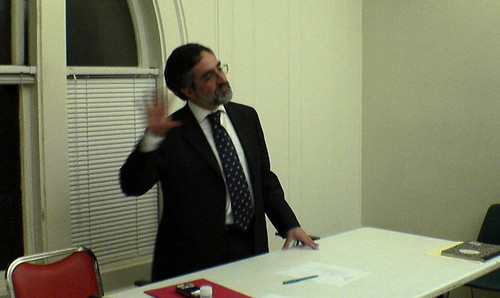(While this is a national and not a state-focused story, I think everyone on this site will be interested to hear about ways to move toward the goal of universal access. Think about how this could impact local blogs if so many more people in this state could use the Internet, particularly in those underserved areas. It would open up the conversation to include everyone. There’s more at my site.)
This is the “chicken in every pot” for the 21st century. And as you will see, it’s extremely doable and completely worthwhile for American competition, entrepreneurship and technological advancement.
In short, the FCC is about to auction off a portion of the broadband spectrum. All the major telcos like Verizon and AT&T are expected to bid on the prime real estate. But John Edwards has a better idea. He wants to have the FCC use that spectrum to increase Internet access for all Americans, young or old, rich or poor. This is the text of his letter to FCC Chairman Kevin Martin:
Dear Chairman Martin:
The upcoming 700 megahertz spectrum auction presents a once-in-a-lifetime opportunity to shape the next generation of American technology.
In recent years, the Internet has grown to touch everything and transform much of what it touches. It’s not the answer to everything, but it can powerfully accelerate the best of America. It improves our democracy by making quiet voices loud, improves our economy by making small markets big, and improves opportunity by making unlikely dreams possible.
As you know, the Federal Communications Commission is now preparing to auction the 700 megahertz slice of the spectrum. This “beachfront” band is particularly well suited to wireless broadband because it has wide coverage and can easily pass through walls.
By setting bid and service rules that unleash the potential of smaller new entrants, you can transform information opportunity for people across America — rural and urban, wealthy and not. As much as half of the spectrum should be set aside for wholesalers who can lease access to smaller start-ups, which has the potential to improve service to rural and underserved areas. Additionally, anyone winning rights to this valuable public resource should be required not to discriminate among data and services and to allow any device to be attached to their service. Finally, bidding should be anonymous to avoid collusion and retaliatory bids.
I urge you to seize this chance to transform the Internet and the future.
Sincerely,
John Edwards
Not only is Edwards asking that the principle of net neutrality be mandated for anyone who buys this spectrum (which is a big victory in and of itself), but he wants a significant portion to be used to wire America. Ultimately, broadband should be no different than electricity; the access should come standard in any home, and you should pay the way you pay your electric bill. Additionally, we should be wiring rural areas the way that FDR pushed rural electrification projects as part of the New Deal. It was actually predicated on the same premise.
Although nearly 90 percent of urban dwellers had electricity by the 1930s, only ten percent of rural dwellers did. Private utility companies, who supplied electric power to most of the nation’s consumers, argued that it was too expensive to string electric lines to isolated rural farmsteads. Anyway, they said, most farmers, were too poor to be able to afford electricity […]
By 1939 the REA had helped to establish 417 rural electric cooperatives, which served 288,000 households. The actions of the REA encouraged private utilities to electrify the countryside as well. By 1939 rural households with electricity had risen to 25 percent […]
When farmers did receive electric power their purchase of electric appliances helped to increase sales for local merchants. Farmers required more energy than city dwellers, which helped to offset the extra cost involved in bringing power lines to the country.
Just as FDR worked to bridge the electrical divide in the 1930s, we should be bridging the digital divide today. Poor and rural areas should be given the capacity to use the Internet, which will open new markets, allow for increased communication and expanded educational tools, and create that equality of opportunity that ought to be a goal. That a top-tier Presidential candidate is pushing this forward-thinking a policy is very cheering.

